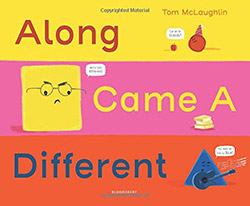Three different groups of coloured shapes just can’t get along. Each group has its own unique set of interests and passions which keep them happy. But whenever a ‘different’ comes along, they end up arguing and criticising each other (the Yellows, much to the disgust of the Blues, love bananas, and the Red’s favourite music is too noisy, according to the Yellows.) They try segregation (by drawing boundaries around themselves) and coming up with rules (‘nobody except reds are allowed in the red corner!’) but these do nothing to promote harmony. The tide turns when some more accepting and tolerant shapes turn up, including a multi-coloured star (‘a really DIFFERENT different’) who likes EVERYTHING. The shapes realise that complimenting and supporting each other is much better than criticising and fighting, the silly rules are forgotten and everyone is much happier…they realise that being different is ‘the best thing ever!’
Categories: Acceptance & Inclusion, Being Different & Being Yourself, Confidence & Self-esteem, Curiosity & Creativity, Friendship & Getting Along, Kindness, Manners & Politeness, Resilience / adaptability
Along Came A Different
 A fun story about different shapes who learn to put aside their differences and get along. Promotes open-mindedness, kindness and tolerance.
A fun story about different shapes who learn to put aside their differences and get along. Promotes open-mindedness, kindness and tolerance.
Author: Tom McLaughlin
Illustrator: Tom McLaughlin
Publisher: Bloomsbury
This video link is provided to help an adult assess the book's suitability for a child's situation before purchasing it. It has been filmed by a third party and hosted on YouTube and is not made by Little Parachutes. More info
The messages we found in this book:
Acknowledgement:
- Children are often apprehensive about trying or accepting something new or different.
Guidance:
- Kindness is infectious. When you are positive and welcoming, you encourage others to do the same. The ‘really different different’ embraced everyone’s interests and provided the catalyst for positive change.
- There is more that unites us than divides us. Sometimes you need to try things to know if you like them or not. Once the shapes stopped focussing in on what they disliked, they were able to discover things that they liked.
- Groups which exclude people don’t lead to happiness (eg, playground gangs and cliques). Neither do stringent rules that are drawn up to segregate people.
- Playing together and co-operating makes you feel far happier than avoiding people, fighting with them and being critical.
Hope & Inspiration:
- The shapes learned to co-operate with each other and focus on the positives instead of the negatives. They replaced critical phrases (we don’t like bow ties, red songs make far too much noise) with complimentary ones (I really like your glasses, I wish I had a red hat like yours).
- The ‘really different different’ was tolerant, optimistic and open-minded. His enthusiasm and warmth rubbed off on the others.

